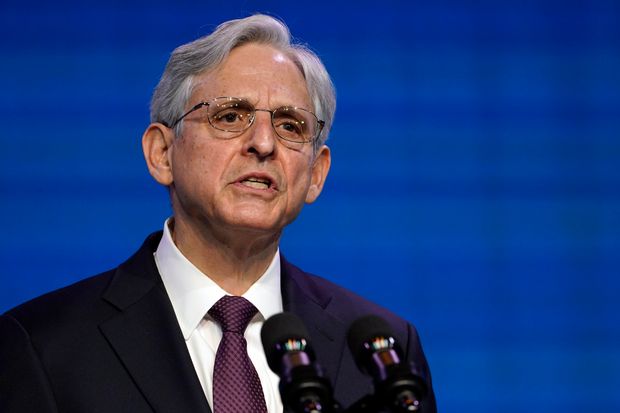
WASHINGTON—The Justice Department has issued a memo that aims to limit the impact of a landmark Supreme Court ruling protecting gay and transgender people in the workplace, a last-ditch attempt from the Trump administration to hinder policy shifts expected as President-elect Joe Biden begins assembling new leadership at the agency.
The Supreme Court’s June ruling, Bostock v. Clayton County, said a bedrock federal civil-rights law prohibits employers from discriminating against workers on the basis of their sexual orientation or gender identity. The 6-3 opinion, by Trump-appointed Justice Neil Gorsuch, rejected administration arguments that federal civil rights law provides no protection to LGBT employees.
The new memo, dated Sunday and sent by the acting head of the Justice Department’s civil rights division, John Daukas, acknowledges the court’s ruling was sweeping but says the department shouldn’t extend it further to areas where longstanding gender-based policies on bathrooms and sports teams could come into play. The 23-page memo, reviewed by The Wall Street Journal, also suggests that some employers could cite religious beliefs that would allow them to discriminate against LGBT employees.
“Unlike racial discrimination, the Supreme Court has never held that a religious employer’s decision not to hire homosexual or transgender persons ‘violates deeply and widely accepted views of elementary justice’ or that the government has a ‘compelling’ interest in the eradication of such conduct,” the memo says.
The Trump administration “lost the case, so they are looking for every possible way to narrow its implications rather than acknowledge that the days of discriminating against people because of their sexual orientation or gender identity are behind us,” said David Cole, national legal director of the American Civil Liberties Union, who argued a companion case to Bostock.
The memo likely will be rescinded by incoming Biden administration officials but could serve as what Mr. Cole called a “road map for the right” in developing arguments against extending LGBT rights.
A Justice Department spokeswoman declined to comment on the memo.

President-elect Joe Biden’s nominee for attorney general, Merrick Garland, spoke in Wilmington, Del., on Jan. 7.
Photo: Susan Walsh/Associated Press
Biden officials are poised to reverse many of the right-leaning policies of the Trump administration, which sidelined many of the Obama administration’s liberal priorities. In addition to arguing that federal civil rights law provided no protections to LGBT people, the Trump administration also sought to bar transgender recruits from serving in the military, a policy that Biden Defense Secretary-designate Lloyd Austin says he opposes.
At the Justice Department, Mr. Biden is expected to oust two Trump appointees who have been in charge during the administration’s final days: Acting Attorney General Jeffrey Rosen and his deputy, Richard Donoghue, people familiar with the matter said.
The new president is expected to name a career official, Monty Wilkinson, to temporarily lead the department, people familiar with the matter said, installing a longtime civil servant as acting attorney general while his nominee, federal appeals court judge Merrick Garland, awaits confirmation by the Senate.
Mr. Wilkinson, who has served in a number of roles, has most recently been overseeing human resources, security and emergency planning as well as the Justice Department’s library. Mr. Wilkinson, well-known within the department but relatively obscure outside it, previously had been in charge of the office that oversees U.S. attorneys offices and worked for years as a federal prosecutor.
The Biden team hopes that Mr. Wilkinson’s experience and low profile will help steady the department in the interim period, one of the people said. The Wilkinson decision was earlier reported by the New York Times.
A Justice Department spokesman declined to comment on the personnel changes.
The Biden team also intends to install John Carlin, the former head of the department’s national security division under President Obama, in a top Justice Department post that would make him the acting deputy attorney general until the nominee for the job is confirmed, the people said. Mr. Biden has said he would name Lisa Monaco, a longtime national security official, to the position; Mr. Carlin will likely become her top aide, the people said.
In making the moves, Mr. Biden is bypassing the Justice Department’s traditional succession order under which John Demers—currently the head of the national security division and one of the few remaining Senate-confirmed leaders—had been expected to fill the role of acting attorney general. Mr. Demers instead will remain in his current role during the transition, the people said.
Mr. Biden has said he would name Vanita Gupta as the department’s No. 3 official and Kristen Clarke, president of the Lawyers’ Committee for Civil Rights Under Law, to lead the civil-rights division. They didn’t return calls for comment about how they might handle the new guidance, but both have opposed policies that they believe undermine LGBT rights.
Mr. Daukas’s memo on LGBT rights speaks critically of the Bostock decision, calling it a “sea change” in antidiscrimination law. “No one in 1964—whether the Member of Congress voting on the statute or the average person on the street—would have understood Title VII the way that the Supreme Court interpreted it in Bostock,” he writes.
The memo says that Bostock’s reasoning, which relied heavily on the civil rights act’s text, could provide ammunition to strike down affirmative-action programs on the theory that they discriminate in favor of racial minorities.
While some broader aspects of federal antidiscrimination law must now be read to protect LGBT people, Mr. Daukas argues that there are broad grounds to fire or refuse to hire such employees for religious reasons.
For instance, under the Religious Freedom Restoration Act, an employer shouldn’t be forced to have someone on the payroll who is undergoing a gender transition if the employer believes that would make him or her “complicit in conduct that the employer’s religion forecloses,” Mr. Daukas writes.
Write to Sadie Gurman at sadie.gurman@wsj.com and Jess Bravin at jess.bravin@wsj.com
Copyright ©2020 Dow Jones & Company, Inc. All Rights Reserved. 87990cbe856818d5eddac44c7b1cdeb8